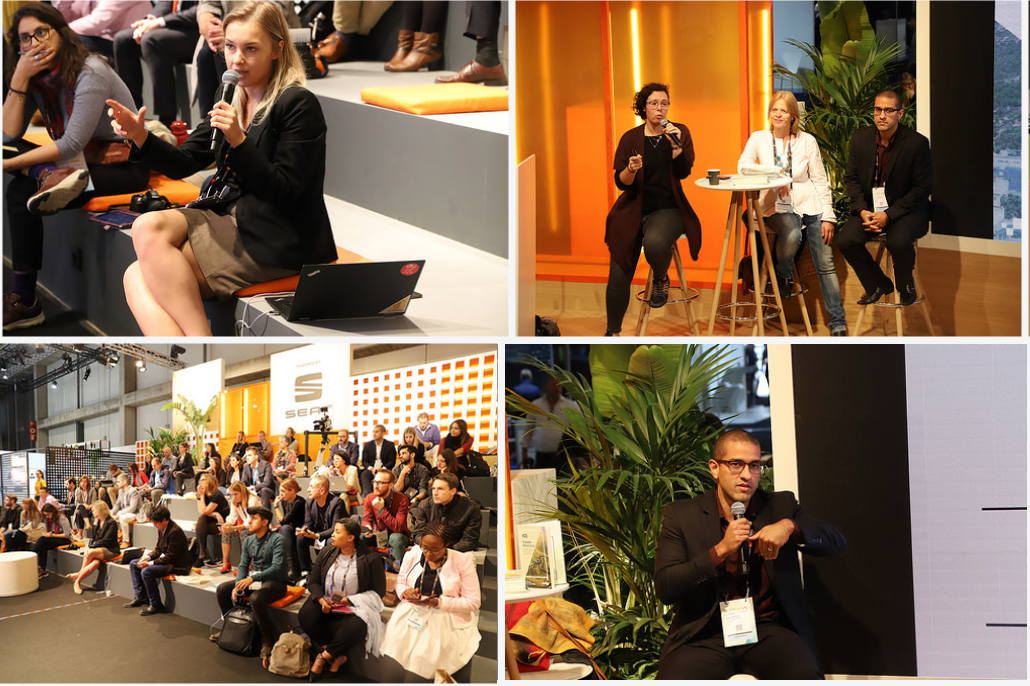Building inclusive cities through multi-level governance at the Smart City World Congress
16.11.2018
The Smart City World Congress was held in Barcelona from November 13 to 15. Local and regional leaders were active in the various debates that took place throughout the event.
UCLG’s participation enriched the debates on multi-level governance, partnerships and sustainable mobility, key issues for the future of our cities.
The high-level panel “How City Leaders Can Better Foster Innovation for More Livable Cities” brought together representatives from the cities of Barcelona, Dubai and Maputo. Pere Calvet, President of International Association for Public Transport (UITP) and Emilia Saiz, Secretary General of UCLG, set the scene from the international level, recalling the importance of working in partnerships taking into account all stakeholders and that the discussion around mobility has shifted from a question of infrastructure, towards a more holistic approach, where issues like inclusivity, public space and finance also play an important role.
Mercedes Vidal, Mobility Councilor of the City of Barcelona, Muna Al Osaimi, Director of Transportation Strategic Planning of the City of Dubai, Joao Matlombe, Mobility Councilor of Maputo shared their experiences in defining, managing, implementing and monitoring innovation for Urban Mobility. The question on future challenges was address by participants, after the intervention of Octavi de la Varga, Secretary General of Metropolis, who stressed the importance of mobility based on an integrated approach, as a critical element for the quality of life in metropolitan areas.

The session ended with the official launch the “Innovation Cluster” of the Mobility Champions Community, a joint initiative of UCLG and UITP that is led by the City of Strasbourg and the Government of Jakarta. The Innovation Cluster of the Mobility Champions Community serves as a thematic cluster of the global platform where insights and good practices related to innovation and urban mobility are shared.
The plenary session: “Bringing Down Barriers: What Building an All-Inclusive Society Means” concluded the first day of dialogues and debates. In this session, representatives from local governments and the private sector debated around on the obstacles –both physical and digital- that are found when building an inclusive society, and how to tackle them. Emilia Saiz, Secretary General of UCLG highlighted the importance of multi-stakeholder partnerships in this regard, where “all actors assume the responsibility of ensuring that citizens have a better life by respecting local realities and local needs. Innovation goes beyond the development of new technology. Smart and inclusive cities need to tackle spatial, economic and social exclusions, and we need to make sure new technologies help closing the inequality gap.”

On Wednesday 14 November, UCLG organized an interactive session on the localization of the Sustainable Development Goals (SDGs). Through an open dialogue, participants learned about UCLG’s work and its tools to guide local and regional governments in the localization of the SDGs. In addition, attendees shared different experiences on the SDGs and the role of local and regional governments in achieving sustainable development and leaving no one behind.
Finally, on 15 November, UCLG presented the session “Intermediary Cities and the Localization of the SDGs” in which the results of the World Forum of Intermediary Cities and the Chefchaouen Charter-Declaration of the Intermediary Cities of the World were introduced, and some of the most outstanding challenges faced by intermediate cities in the Amazon region were highlighted. Arthur Machado, deputy mayor of Boa Vista, brought the political dimension to this session, which had various interventions from the attendees.
Along with UCLG, many other members of the Global Taskforce such as C40, Metropolis, ICLEI, UN Habitat, or the United Nations Global Compact, among others, were present at the meetings supporting to take into account local actions on various issues around sustainability to meet the Sustainable Development Goals.